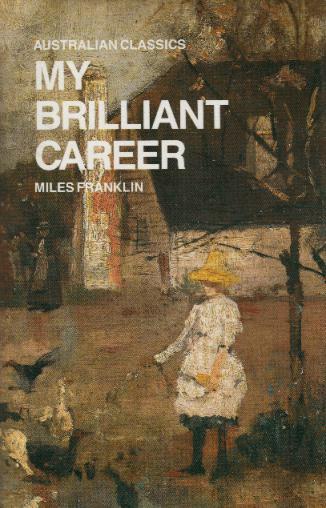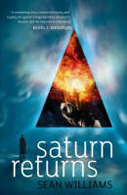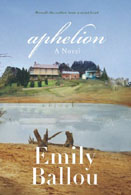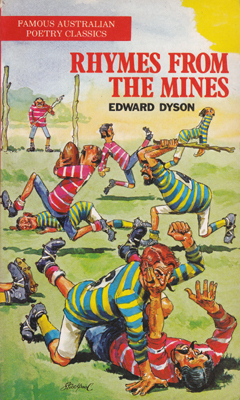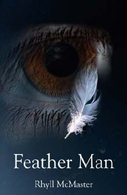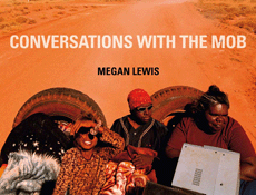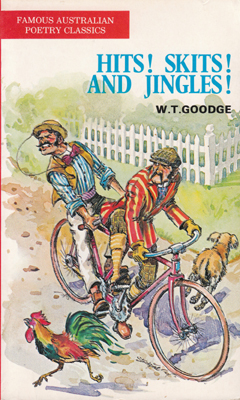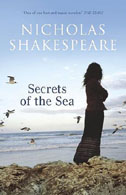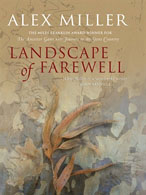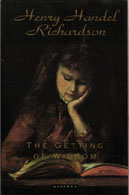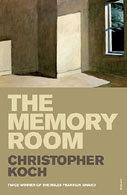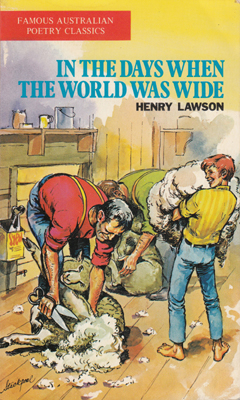There has never been a complete collection of Marcus Clarke's work
published -- and there never will be. Hidden away in old periodicals
and newspapers are scores of his unsigned items, some of which can been
identified by peculiarities of the author's style; for, like George
Augustus Sala, the greatest journalist of all time, Clarke could invest
a seemingly unimportant par. with a literary flourish. However, the
purpose of this article is not to discuss the merits of Marcus as an
all-round journalist, but to consider him from an entirely new angle --
that of "terrorist".
Perhaps you will say there are horrors enough in "His Natural Life"
to glut the most epicurean. Admittedly so; but it is to his smaller
pieces, such as, for instance, that brightly written little story "The
Mind-Reader's Curse," we must turn to appreciate him as a shocker.
One of his earliest efforts, "The Mantuan Apothecary," which
appeared in the "Australian Monthly" (later transformed under Clarke's
supervision into the "Colonial Monthly"), has a tastefully worded
conclusion. There is to me something particularly pleasing in the last
paragraph where the Mantuan Apothecary meditates on "The chains, the
crowd, the hangman and the gallows!"
Two Christmas stories of his were masterpieces of suggested horror.
"The Man with the Oblong Box" (which contained a corpse that the man
was evidently keeping as a souvenir) is a narrative tale with an
artistic touch; the author, while cleverly avoiding the least suspicion
of actual gruesomeness, gives the reader eloquent proof of the box's
shocking contents.
"Treasure Trove" in "The Australian Annual 1858," was the other
Christmas thriller. The late Thomas Carrington executed a very
realistic plate for this tale, depicting two unkempt and ferocious
desperadoes clawing golden ingots from each other. One gentleman is
slightly inconvenienced through having to hold his dagger in his right
hand, but his opponent is more practical-minded, with his weapon
between his clenched teeth, he is able to use both hands in the
scramble. Unfortunately, nobody gets the gold. Both perish in the
frozen ocean and the story is read from an MS. found in a bottle.
There is a distinctly Biercian flavor in some of Clarke's minor
sketches. The poem of "How Bill Jinks Died," written as a burlesque of
Jim Bludso, is worthy of the Great Ambrose himself.
A fire takes place, Bill seats himself on the muzzle of the hose, is
propelled to the window-ledge, and rescues Maggie, the eighty-year-old
virgin just as she is "frizzling brown." They descend on the sinking
stream, but something goes wrong, and the poet then tells us:
"Twas Meg survived -- this smoke I guess
Just makes my eyelids smart;
But Bill was just an unpleasant mess,
Like a trod-upon raspberry tart!"
That
once popular penny weekly production, the "London Journal," Clarke
never wearied of deriding. This paper specialised in fierce romances of
adventuresses, and meek-eyed maidens, of the "Ah me! let me die!" type,
who shrank, either in fear or expectancy, from scheming, teeth grinding
villians.
These miscreants were all of unblemished turpitude, closely
resembling the sublimely immoral schoolmaster in Miss Braddon's "Three
Times Dead, Or the Trail of the Serpent," who, after disposing of
sundry victims, destroys all trace of his crime by quaffing the water
in which he had washed his gory hands! Those "London Journal"
profligates were all ruthless disrupters of home life, and Marcus got a
lot of amusement out of ridiculing them.
Nevertheless, when he assumed the proprietorship of the "Colonial
Monthly" in 1868, he ran as a serial his tale, "Long Odds," which was
worthy of the "London Journal" in its palmiest days! It was a cross
between Dickens's "Our Mutual Friend" and Shirley Brooke's "Gordian
Knot," only its moral was slightly better than the first mentioned.
This may seem rank heresy to Dickensians, but may I mention, in
parenthesis, that I have often marvelled how Dickens, with his
preference for the fustian-clad hero, could turn poor Bradley
Headstone, the protector of the innocent, into the villian of the piece!
However, there wasn't a hero of any sort in "Long Odds," unless it
was Binns, the neglected suitor, protector and avenger of the
simple-souled, blighted damsel who served as heroine. Incidentally, she
was a devotee of the detested "London Journal," and, I daresay, it was
to this we were meant to trace her downfall.
The villian gets his desserts from the equally guilty husband thus:
Rupert Dacie enters his room and strikes a match, there being, of
course, in those days no switch to turn over. Then "with hoarse cry and
knife upraised, the waiting assassin leapt upon him, and as the
expiring match dropped from his hand, its blue flickering flame showed
him for one single second the white face and bloodshot eyes of Cyril
Chatteris."
After having written the early instalments to this tale, Clarke fell
from his horse and fractured his skull, recovering in time to add the
climax and revise the work for publication in book form. His style
showed a marked improvement after this accident (just as a similar
mishap turned Ambrose Bierce into the strange, wild genius we know him
to be), and I am sure we owe the advent of "His Natural life" to this
simple casualty.
Clarke has been criticised for the part he made John Rex play as
impersonator of the "rightful heir" in "His Natural Life" and the
probability of such an occurrence has been doubted. Judging from the
old-time literature I have seen carrying Marcus Clarke's autograph, I
fancy he found the basis for this story of deception in the narrative
of Martin Guerre, the ex-Algerian slave. Martin escaped and returned to
France, only to find that a former fellow convict, in whom he had
confided, and to whom he bore a striking resemblance, had usurped his
wife and other possessions! Besides, just about the time Marcus was
writing his magnum opus, the Tichborne imposture was attracting public
attention.
Clarke, the story writer, poet, novelist and dramatist -- the
transplanted Englishman so typically Australian -- will surely not be
forgotten, during the coming Centenary celeberations. What about a
statue to him!
First published in The Herald, 13 January 1934
Notes:
"Jim Bludso" was a 1917 silent film directed by Todd Browning, about a riverboat captain who sacrifices himself to save his passengers from a fire.
Wikipeda has pages detailing the Martin Guerre affair, and the Tichborne Case.
The Centenary mentioned in the last paragraph refers to the 100th
anniversary of the founding of the colony (in 1835) that later became
the State of Victoria in Australia.
